01 Mar Marking One Year of Mobile Technology for Community Health Workers
by Karen Finnegan, Scientific Director & Mariot Rasolonjatovoarinoro, Information Systems Manager
In Madagascar, community health workers (CHWs) provide essential health services for pregnant women, sick children, and other community members. CHWs — who by definition are embedded in their communities across Ifanadiana District — engage in the health of their communities up close. They are our first, best source for information on whether or not people are healthy. Historically, CHWs have recorded patient information on paper forms, and at the end of the month, they manually aggregate the information collected and submit a report summarizing their activity.
In March 2021, CHWs in Ifanadiana District started using CommCare, a mobile application for data collection, to support their daily work and report health information in real time. The CommCare application allows CHWs to store and access patient information on a smartphone.
Challenges related to internet availability guided the Government of Madagascar’s (GoM) decision to pilot CommCare, which – crucially in a largely rural country – enables CHWs to collect data offline and sync with the patient database once reconnected. As the GoM considers scaling the application nationally, we aim to support the process by sharing evidence and firsthand experience about what is working well and what could be improved.
The current version of the CommCare application has several modules which support essential CHW services: routine monitoring and care of children under five, child malnutrition screening and follow up, family planning, pregnancy and postpartum monitoring, sensitization, referrals, and tuberculosis screening.

CHWs provide diverse and essential services and the CommCare application eases their data collection burden and facilitates high quality care. As CHWs enter data on their patient visits, the application prompts them to ensure that no diagnosis or treatment steps are overlooked, and automatically sends reminders about patients requiring follow up visits. Eventually, the application will be able to send information about patients to the health center ahead of a referral made by the CHW.
Said Pivot-supported CHW Yvonne, “…it automatically shows the patient’s next appointment, for example the next appointment for a woman using family planning, so she does not need to worry about counting days [to track when a refill is needed]. In the same way, when a sick child is admitted, the date of the exam is immediately available.”
CommCare also supports CHWs in providing high quality care through built-in algorithms: “for example a… prescription. If something is wrong, CommCare corrects it, with a red mark, you can correct what went wrong,” explains CHW Landry Alain.
In addition to enhancing clinical care and reporting, CHW use of CommCare enables us to answer new research questions. We are now able to capture detailed information on how CHWs provide care during their visits, allowing us to answer questions about improving quality of care and testing the impact of new programs or interventions on CHW performance.
The launch of CommCare for use by CHWs in Ifanadiana District represents a partnership with Dimagi, a technology company which supports electronic data collection in countries across the world, and ACCESS, a USAID-funded program implemented across Madagascar by Management Sciences for Health. Together, the organizations are providing support to CHWs throughout Madagascar.
In collaboration with these partners, Pivot is advancing in its ongoing mission to strengthen Madagascar’s public health system and to improve the well-being of the population of Ifanadiana District.
